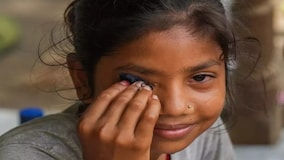Infection
Conjunctivitis cases on the rise: Can sunglasses prevent the infection?
Conjunctivitis cases are on the rise in several places across India, including New Delhi, Andhra Pradesh, Chandigarh, and Gujarat. Dr Kartikay Kumar, senior resident, Rajendra Prasad Centre, AIIMS Delhi, told The Quint that they are getting more than a hundred cases every day. “We always see cases go up during the monsoon, but this is the first time we are seeing it on this scale,” Dr Kumar stated.
Whenever someone contracts conjunctivitis, also known as ‘pink eye’, they are often seen wearing sunglasses or black goggles. Now, amid the soaring cases in Delhi and the National Capital Region (NCR), the Delhi Police have taken a quirky way to urge people to wear black shades.
Referring to the hugely popular Kala Chashma song, the police said in an Instagram Reel, “To all those suffering from conjunctivitis, ‘Tennu kala chashma jachda ae, jachda ae tere mukhde pe‘. Please wear glasses get well soon”.
Related Articles
Heavy rain, floods spark conjunctivitis outbreak in Delhi: How bad is it?

Conjunctivitis hits Delhi with over 100 cases a day
But does the ‘kala chashma‘ really help in conjunctivitis? Let’s find out.
What is conjunctivitis?
According to the American Optometric Association (AOA), conjunctivitis is the “inflammation of the conjunctiva, the thin, transparent layer of tissue that lines the inner surface of the eyelid and covers the white part of the eye” from infection or allergies.
Its common symtoms include eyes turning red, itching, irritation, an increase in tear production, and a watery or thicker discharge from the eye, as per United States Centers for Disease Control and Prevention (CDC).
“In rare but severe cases, patients come in with swollen, painful eyes as well,” Dr Dhruv Chauhan, Physician, Sanjeevan Medical Research Centre, Delhi, IMA-MSN National zonal coordinator, told The Quint.
There are three main types of conjunctivitis depending on the cause: allergic conjunctivitis, bacterial or viral conjunctivitis and chemical conjunctivitis.
Do sunglasses help?
Yes, they do.
Those who get conjunctivitis infection, their eyes become sensitive to light, say experts. Donning dark glasses helps the patients to prevent dust and light from entering the eyes, thus not causing further irritation.
“It is not uncommon to see people with conjunctivitis wearing dark sunglasses, assuming it is to prevent the spread of the infection when looking at others. However, it’s important to know that conjunctivitis cannot spread just by looking at someone who has it. The primary reason for wearing these glasses is to alleviate discomfort caused by light sensitivity,” Dr Manoj Prathapan, Clinical Professor, Ophthalmology at Amrita Hospital, told India Today.

Speaking to News9, Dr Rashmi Mittal, Consultant, Department of Ophthalmology, at Faridabad’s Amrita Hospital, explained how sunglasses help those suffering from conjunctivitis.
“Firstly, it prevents the patient from repeatedly touching and rubbing his eyes and thereby spreading the infection to others around him. Secondly, severe eye flu can be associated with significant photophobia and sensitivity to light. In these patients, wearing dark glasses provide comfort and relaxation to the eyes,” Mittal said.
Do dark sunglasses curb the spread of infection?
Not entirely.
Experts have warned that only wearing dark glasses cannot prevent the transmission of infection.
Dr JS Titiyal, head of RP Centre for Ophthalmic Sciences, AIIMS, told Times of India (TOI) said that dark glasses “do not prevent” the ocular infection from spreading. Titiyal pointed out that touch is crucial here and patients must ensure they do not share their belongings, such as laptops and mobile phones, with others.
“If you touch such things, you should sanitise your hand and work area, like people used to do during the COVID-19 crisis,” he said.

“You should not touch the goggles used or touched by an infected person. In fact, anyone can catch the infection through dark glasses. If an infected person takes them off, the surface on which he keeps them can become contaminated and later infect anyone who touches such a surface,” Dr Titiyal told TOI.
ALSO READ: Spike in dengue cases in India: How bad is it?
How to prevent the spread?
Practicing good hygiene can help keep a check on the spread of conjunctivitis as the infection mostly spreads through the hands.
Dr Soveeta Rath, Pediatric Ophthalmology, Strabismus and Neuro-Ophthalmology told news agency ANI that it is “necessary to maintain hygiene” and keep our personal belongings like towels and handkerchiefs separate. They should not “be shared to avoid spreading (the infection) to other family members”. and seek prompt medical help to manage these conditions effectively,” Dr Rath added.
Patients should also avoid touching their eyes as it raises the risk of the spread.
Underlining the importance of maintaining hand hygiene, Dr Saurabh Varshney, senior consultant in ophthalmology at Primus Super Speciality Hospital, recommended sanitising hands after touching public surfaces, reported TOI.
With inputs from agencies

